The best business phone system delivers high-quality voice communications at a price that is doable for businesses of all sizes. With the advent of voice-over-internet-protocol (VoIP) technology, making crystal-clear calls is both efficient and inexpensive, even when dialing overseas. In this guide, we’re going to show you the seven best business phone systems so that your team can communicate easily with customers, colleagues, and partners.
- RingCentral: Best overall phone system
- Zoom Phone: Best for video conferencing
- Nextiva: Best for toll-free minutes
- Vonage: Best for customizability
- Dialpad: Best for customer engagement
- Grasshopper: Best virtual phone system
- Ooma: Best for international calling
Best Business Phone Systems at a Glance
Free Business Phone Number Apps | Starting Monthly Price (per user) | Types of Business Phone Numbers | FSB Rating |
|---|---|---|---|
$30 |
| 4.61 out of 5 | |
$10 |
| 4.59 out of 5 | |
$30.95 |
| 4.51 out of 5 | |
$19.99 |
| 4.40 out of 5 | |
$23 |
| 4.38 out of 5 | |
$17 |
| 3.98 out of 5 | |
$19.95 |
| 3.93 out of 5 | |
RingCentral: Best Overall Business Phone System
What We Liked
- Access to 300+ third-party integrations
- Every type of virtual number, including local, international, vanity, and toll-free
- Comprehensive application programming interface (API) documentation
Where It Falls Behind
- Somewhat more expensive than other providers when not taking advantage of annual and volume discounts
- Can be complex to set up
- No CRM integrations at entry-level plan tier
RingCentral Monthly Pricing*
- Core: $30 per user for a local or toll-free number, unlimited domestic calls and texts, visual voicemail, document sharing, and call management features
- Advanced: $35 per user for video meetings with 100 attendees, unlimited internet fax, unlimited audio conferencing, and multi-level auto-attendant
- Ultra: $45 per user for video meetings with 200 attendees, hot desking, real-time analytics, single sign-on (SSO), device alerts and status reports, and customer relationship management (CRM) integrations
- Free trial: 14 days
*Save up to 33% with annual payment, and volume discounts are also available.
When it comes to modern VoIP phone systems, RingCentral is the leader for a reason. To start, this provider delivers more than 300 integrations with popular providers like HubSpot, Salesforce, and Zoho. This helps small businesses quickly connect their favorite third-party software providers to their business phone systems. RingCentral also has application programming interface (API) support so that businesses with IT organizations can edit the software to create even more connections.
From a communication perspective, RingCentral has dedicated features like an interactive voice response (IVR) system, analytics, and call monitoring. Unified communications (UC) is also a focus for the provider, with team messaging, video conferencing, and e-fax being available so that your team always has a strong way to communicate. Reliability is also exceptional; with every plan, you’re guaranteed a 99.999% uptime rating. This amounts to about five minutes of downtime per year.
Still, RingCentral trails some providers when it comes to the service’s cost. Without taking advantage of any discounts, it costs $30 per month. While this wouldn’t be bank-breaking, consider that this is per-user and providers like Grasshopper deliver a similar cost without per-user rates. Also, providers like Zoom Phone feature calling at nearly a third of the cost of RingCentral. Fortunately, RingCentral also has volume and annual discounts, which bring the costs down dramatically.
RingCentral Features
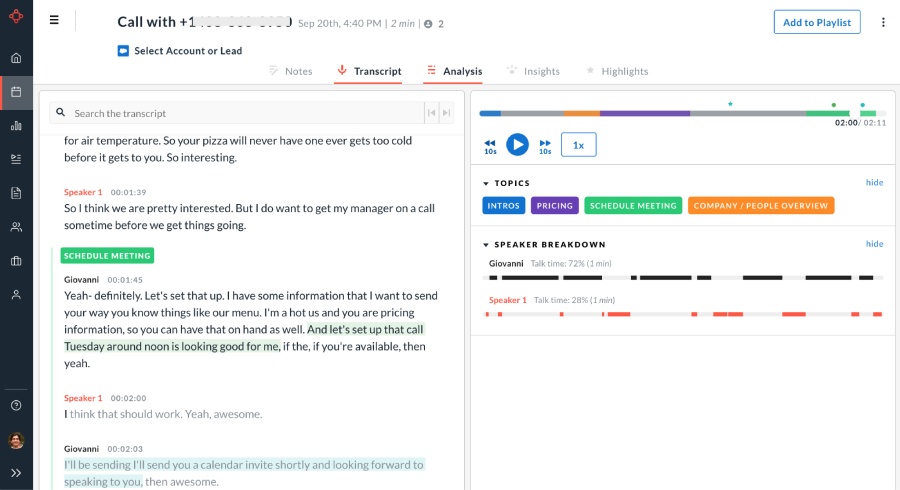
Enable RingCentral’s Conversation intelligence features when reviewing past meetings. (Source: RingCentral)
- AI transcription: Like Dialpad, RingCentral utilizes artificial intelligence (AI). This employs conversation intelligence to deliver insights into the meeting itself for those who were unable to join or who came late.
- RingOut: Similar to call flip, RingOut allows you to send your calls to another device. The chief difference with this is RingOut lets you also use a landline or mobile connection when you have unstable internet. Even when dialing from a landline, your RingCentral number will show on the caller ID of your customer/business associate.
- Visual voicemail: This feature helps you quickly review your voicemails. Rather than having to listen to each, you can see all voicemails in a visual interface so that you can know which ones to prioritize.
Zoom Phone: Best for Video Conferencing

What We Liked
- Very small business-friendly pricing at base tier
- Plans with both metered and unmetered structures
- Local phone service in 40+ countries
Where It Falls Behind
- Costs extra for real-time reports
- Toll-free numbers cost extra
- Lacking task management features
- No free trial option
Zoom Phone Monthly Pricing
- Pay As You Go: $10 per user for a local phone number, domestic SMS and multimedia messaging service (MMS), team chat, and video conferencing
- Unlimited: $15 per user for unlimited calling within the U.S. and Canada, local phone number, domestic SMS and MMS, and optional add-on of unlimited calling to 19 countries
- Pro Global Select: $20 per user for unlimited domestic calling within one of the 40+ countries supported, direct dial number, and optional add-on of unlimited calling to 19 countries
Zoom has made a major name for itself thanks to its video conferencing solution, but its business phone system is quickly becoming a major name in the industry. To start, Zoom Phone has some very reasonable monthly subscription rates; there’s a pay-as-you-go tier that only costs $10 per user, and unlimited calling only scales up to $15 per user.
For those needing more, the Pro Global Select tier is only a monthly cost of $20, and with this plan comes unlimited dialing to more than 40 countries. Of course, Zoom has earned its name through video conferencing, and with Zoom Phone, you can quickly convert calls to video conferences when needed. While it’s not quite as connectable as RingCentral, Zoom phone has extensive third-party integration with over 80 solutions.
Zoom Phone is still lacking virtual fax, so if you need to send faxes to customers and clients, consider a provider with tiers that offer e-fax, such as RingCentral. RingCentral has the capability of both sending and receiving faxes using any type of device. Additionally, Zoom Phone doesn’t bundle in some key analytics; for this, you’ll have to pay extra. Most analytics are included with RingCentral plans.
Zoom Phone Features
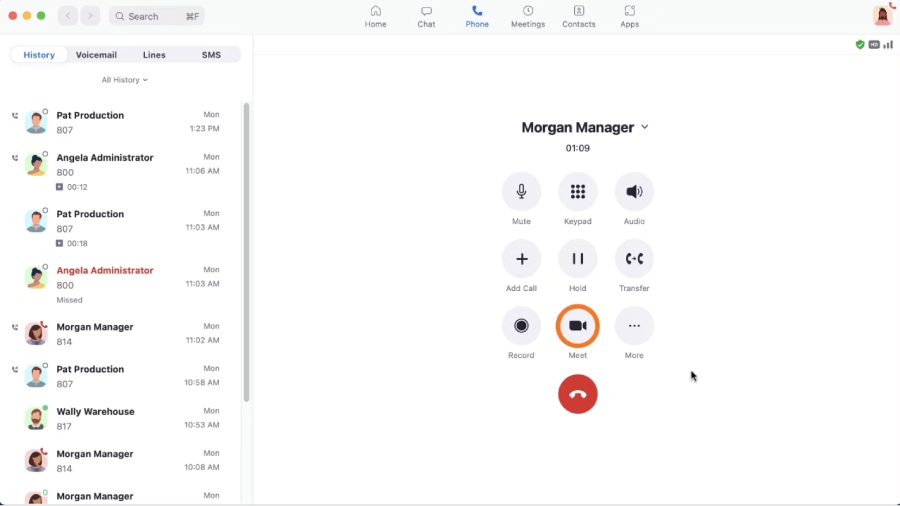
Zoom allows calls to be instantly upgraded to Zoom video meetings with the use of in-call controls.
(Source: Zoom Phone)
- Unlimited international calling: In an industry where cheap international calls are common, it’s nice to have a provider that makes global calls even cheaper. With Zoom Phone’s second tier, you’re granted unlimited international calling to 19 countries and an additional 20-plus at the highest tier. This easily helps businesses with frequent international calls to save money.
- Pay-as-you-go: Zoom is one of the few providers in this guide with a pure pay-as-you-go plan. For $10 per month, you’re granted access to domestic calling with short message service (SMS) and multimedia messaging service (MMS) texting. You’re charged a very reasonable rate for each call and text, which is perfect for businesses with low calling/messaging needs.
- Mix-and-match plans: With any Zoom Phone plan, you’re not limited to specific features. You’re able to mix and match the specific features to create the plan that best fits your business.
Nextiva: Best for Toll-free Minutes

What We Liked
- 12,500 toll-free minutes at the highest tier
- Access to multiple types of virtual numbers, including toll-free, local, and vanity
- Very inexpensive international calling
Where It Falls Behind
- Video conferencing is limited to 45-minute durations
- Less than 20 integrations
- No plan with international numbers
Nextiva Monthly Pricing*
- Essential: $30.95 per user for free local and toll-free numbers, a maximum of 1,500 toll-free minutes, auto-attendant, and video meetings for up to 45 minutes
- Professional: $35.95 per user for a maximum of 3,000 toll-free minutes, voicemail-to-SMS, multi-level auto-attendant, and advanced integrations with CRM tools
- Enterprise: $45.95 per user for a maximum of 12,500 toll-free minutes, call recording, voicemail transcription, and single sign-on
- Free trial: 7 days
*Save up to 22% with annual payment; volume discounts are also available.
When it comes to the VoIP industry, Nextiva is often regarded as one of the key players. Its extensive toll-free minutes make it stand out—even trumping other leaders like RingCentral, which you’ll note in our guide to RingCentral alternatives. Tools like its built-in sales management solutions also enable teams to secure deals and manage leads.
As your team propels customers through the pipeline, the progress of each deal is easily tracked through the interface. There’s even project management functionality to track each team member’s progress. Like other providers, Nextiva also is easily cross-platform, with a smartphone app, desktop app, and browser dialing all available. The chief difference is the fact that Nextiva does all of this with a truly intuitive user interface that’s one of the best in the industry.
Even though Nextiva grants domestic numbers of the local, toll-free, and vanity variety, it doesn’t provide numbers out of the U.S. If you need numbers located globally, providers like RingCentral and Dialpad might be more to your specifications.
Nextiva Features
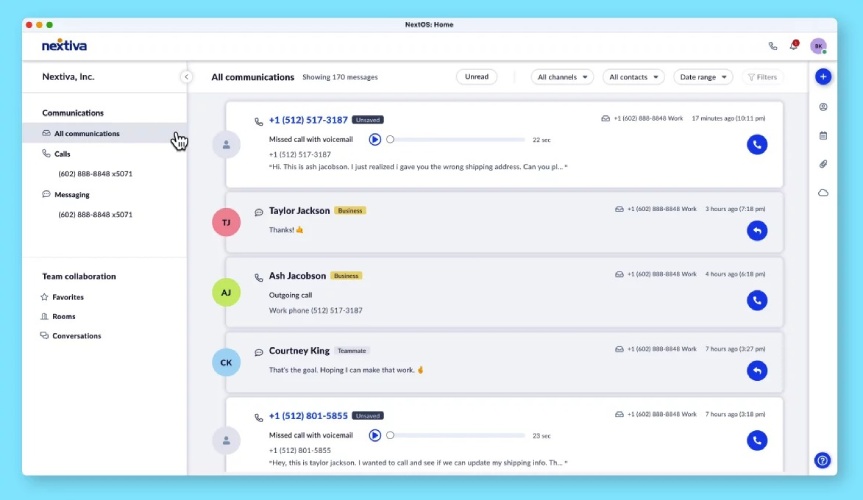
NextivaONE places all communications in an easy-to-access format. (Source: Nextiva)
- NextivaONE: Nextiva’s app is one of the best in the industry. The experience works equally well in both the desktop and mobile versions, and the user interface (UI) is very intuitive. Voice calls, video calls, team chats, and individual messages are all displayed within a tight, easy-to-navigate interface.
- Call notes: With Nextiva, you don’t have to switch screens when you want to annotate a call. Take notes while on the screen with the customer, and these are automatically saved as the call progresses.
- Presence: Team collaboration is a major focus of Nextiva, and with call presence, your team can quickly know when a colleague is available. Each team member’s status is listed within the app with options like busy, unavailable, or ringing.
Vonage: Best for Customizability

What We Liked
- Every plan grants access to up to 43 diverse features
- Unlimited meetings for up to 100 participants
- Team messaging, even at base tier
Where It Falls Behind
- No annual billing discount
- Not a strong provider for integrations
- Requires every subscriber to enter a one-year contract
- No free trial available
Vonage Monthly Pricing*
- Mobile: $19.99 per user for unlimited calls and SMS, use of mobile and desktop apps, access to the Vonage App Center, and unlimited team messaging
- Premium: $29.99 per user for the multi-level auto-attendant, integration with CRM tools, unlimited meetings for up to 100 participants, and internet protocol (IP) desk phone capability
- Advanced: $39.99 per user for on-demand call recording, call group, and visual voicemail
*Volume discounts are available.
Vonage is one of the first VoIP providers to offer the technology and is known as one of the more customizable providers on the market. With Vonage, everything is available as an a la carte feature, so it’s very easy to customize your business phone system for your exact needs. Even with no add-ons, Vonage’s plans include a set of competitive VoIP features at every tier, so you can hit the ground running, even as a new VoIP user.
Features like call queues, phone extensions, virtual assistants, and secondary line appearances are all available as add-on features. This helps businesses accommodate increased call volumes, and you can discontinue these features as business slows down a bit. This makes for a very convenient experience for businesses that don’t want to pay for tools that they don’t always need.
When it comes to integrations, this is where Vonage dips in capability. There are barely over 20 third-party applications that are connectable with the provider, which can be problematic for some companies with extended needs. Additionally, some of the add-on features will quickly increase the monthly pricing of Vonage. For a better integration experience with a more standardized set of available features, consider a provider like Zoom Phone.
Vonage Features
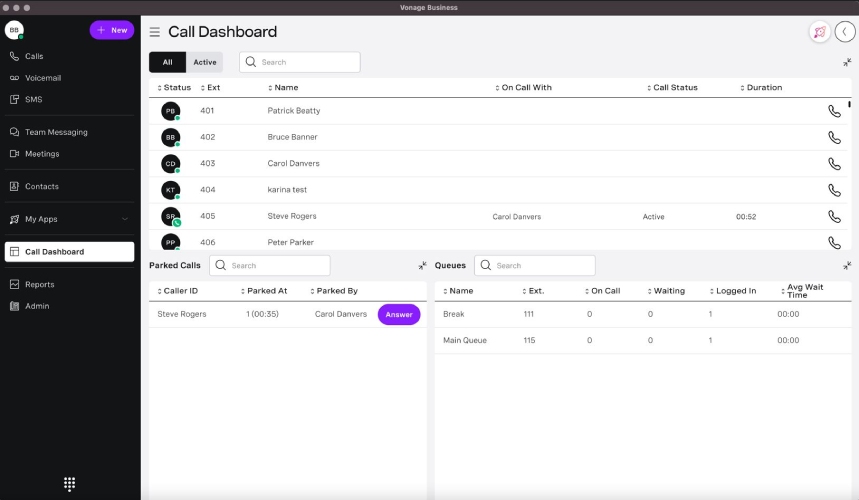
A view of Vonage’s dashboard with call parking. (Source: Vonage)
- Spam Shield: Every inbound call to your business is run through this tool. The system automatically checks the number versus a database of known spam/robocall numbers. If a known spammer reaches out, the system displays a “Suspected Spam” message.
- Call park: When a customer calls, they can be placed on hold and an agent can access the call via a communal parking system. When put in call park, any agent can retrieve the call, even from a mobile device.
- Call groups: Many businesses group their departments, and with call groups, you can send specific calls to agents with specific matching skill sets.
Dialpad: Best for Customer Engagement

What We Liked
- Unlimited calling to the U.S. and Canada
- Provides one local number by default
- One of the few providers with 100% guaranteed service uptime
Where It Falls Behind
- Integrations could be better
- Virtual fax isn’t free
- Toll-free numbers aren’t cheap
Dialpad Monthly Pricing*
- Standard: $23 per user for a local phone number, multi-level auto-attendant, maximum of three ring groups, custom call routing, and video conferencing for up to 10 participants
- Pro: $35 per user for additional local or international numbers, maximum of 25 ring groups, hold queues, and international SMS
- Custom: Custom pricing for phone extensions, unlimited ring groups, and integration with single sign-on solutions
- Free trial: 14 days
*Standard plan pricing drops to $15 per month when you opt for annual billing.
In recent years, Dialpad has really leaned into the power of artificial intelligence (AI) for helping businesses better manage their customers. The Dialpad Ai solution utilizes natural language processing (NLP) to help your agents with customer interactions as they happen. This speech recognition technology provides agents with prompts and automatically takes notes as the inbound or outbound call persists.
This system even gets better over time. This allows subsequent interactions with customers to improve and better meet their needs. The software even analyzes vocal cues to pick up subtle nuances in the conversation that might be missed by the agent alone. To enhance the experience, the system also connects to the supervisor’s console so that they can help the agent with difficult conversations.
While Dialpad shines when executing most UC functions, it starts to fall behind when it comes to video conferencing. While they are currently beta testing more participants and enhancing their video conferencing with AI, their starting video conferencing-capable plan only allows for 10 attendees. For more attendees, consider a provider like RingCentral, which has a starting attendee count of 100.
Dialpad Features
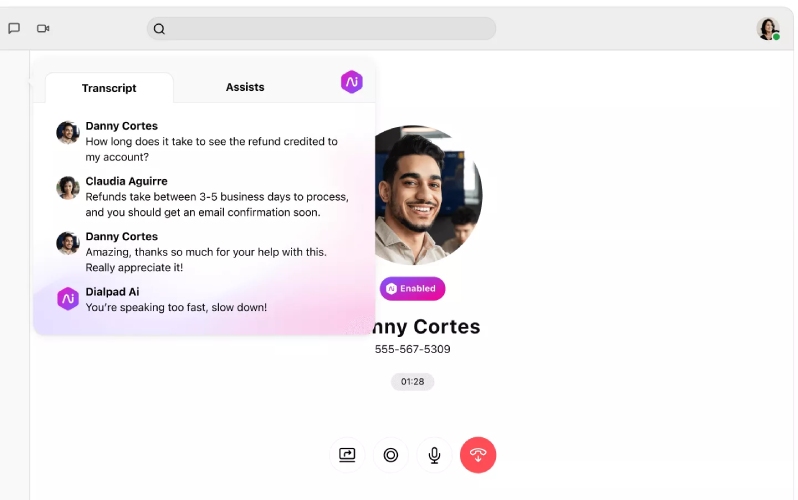
Dialpad Ai delivers prompts to your agents so that customer management is enhanced. (Source: Dialpad)
- Call flip: Similar to RingCentral, this feature lets you quickly flip calls from device to device without hanging up. This is very useful for agents who need to go mobile.
- Snippets: Agents can save clips of each call that span a total of 20 seconds. This is an interactive version of note-taking that’s quickly accessible before further outbound or inbound calling attempts. These are automatically sent to the email of the agent.
- Real-time recommendations: Dialpad Ai provides agents with real-time suggestions and answers to customer questions. This helps your team resolve issues faster without consulting with supervisors.
Grasshopper: Best Virtual Phone System

What We Liked
- No per-user pricing structures
- Unlimited extensions at the highest tier
- A simplified phone system without the need for unified communications features
Where It Falls Behind
- No third-party integrations to speak of
- Doesn’t offer the option for hardware-based VoIP desk phones
- No volume discounts that make the service cheaper as your company grows
Grasshopper Monthly Pricing*
- Solo: $31 for a single number with three extensions and unlimited users.
- Partner: $51 for three phone numbers and six extensions
- Small Business: $89 for five phone numbers and unlimited extensions
- Free trial: 7 days
*Save more than 10% with annual billing.
Grasshopper stands out because of the fact that it’s a virtual phone system rather than a VoIP/UC system. This means that Grasshopper specializes in just providing your company with a working phone line that uses the internet for connectivity. With Grasshopper, you won’t be getting video conferencing, team chat, and task management, but features like call management and user extensions are basic to the service.
This is especially advantageous for small businesses that simply want a business number that their customers use for company contact. Grasshopper even provides three of the four types of virtual numbers so that there are options for each customer. These include local, toll-free, and vanity numbers, and each can be attributed to a pre-existing mobile device so that your agents receive calls on their personal devices.
Effectively, this type of system might not be as useful to every business. Some businesses require video conferencing when team members collaborate, and some also need a means of interoffice chat. For this, a provider like Nextiva may be a better fit since their CoSpace app and its NextivaONE software all specialize in providing unified communications functionality.
Grasshopper Features
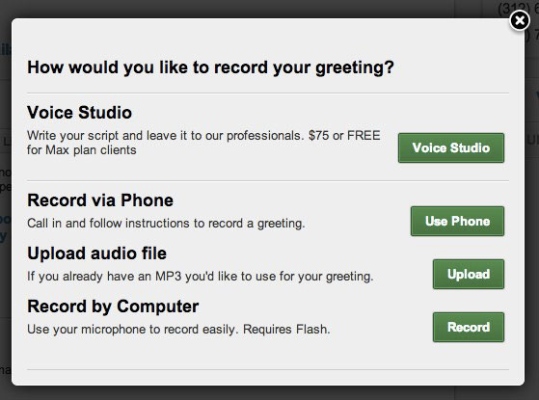
The built-in Grasshopper Voice Studio. (Source: Grasshopper)
- Voice Studio: Rather than seeking out your own voice talent for your company messaging, consider Grasshopper’s voice studio. This studio provides professional voice talent for your auto-attendant. English and Spanish messaging are available.
- Call blasting: Grasshopper allows calls to ring up to 15 phone lines simultaneously. This feature also notifies all team members when a call is received so that your inbound call reception is made more efficient.
- International calling: While Grasshopper doesn’t deliver international numbers, they do support calling to more than 50 countries. Like most systems that use VoIP, pricing is very reasonable. Your Grasshopper account must have been active for at least two months to access international calling with the exception of Alaska and Hawaii—in those jurisdictions, the account must have been live for five days.
Ooma: Best for International Calling

What We Liked
- Unlimited calling that includes the U.S., Canada, Puerto Rico, and Mexico
- Free calling with the purchase of a Telo
- Video conferencing that allows up to 100 attendees
Where It Falls Behind
- No international numbers
- Not a great list of third-party integrations
- No call recording, voicemail transcription, or desktop app access in the base Ooma Office plan
- No free trial option
Ooma Monthly Pricing*
- Basic: Free for one user with the purchase of a Telo device for $99.99, unlimited calls and texts in the U.S., and voicemail
- Essentials: $19.95 per user for music on hold, a toll-free number, digital fax, and email audio attachments
- Pro: $24.95 per user for both desktop and mobile apps, text messaging, call recording, voicemail transcription, dynamic caller ID, and analytics
- Pro Plus: $29.95 per user for advanced reporting, Salesforce integration, Ooma meetings recording, call screening, and find me, follow me
*Basic plan requires a purchase of a Telo device, costing $99.99.
Ooma is a great provider for solopreneurs just starting out because its basic plan is virtually free when you purchase one of its Telo analog telephone adapter devices. This device converts traditional landline telephones to VoIP, which provides clearer service for next to nothing. In addition to its home service, Ooma also has its Ooma Office solution, which is very reasonably priced for small businesses.
With Ooma Office, you can also dial overseas without metered rates to over 70 countries. This is best for businesses with global calling requirements that consistently need to reach popular destinations like the United Kingdom, Australia, or Pakistan. While this comes with a slightly higher per-month bill, consistent calling, even with Ooma’s great metered rates, could easily see phone bills spiraling out of control.
Reaching international territories is easy with Ooma, but it’s important to know that the service doesn’t deliver when it comes to international numbers. This means that, while you’ll have no trouble reaching overseas customers, they might have difficulty reaching you. Instead, for a business communications provider that has reasonable metered rates for overseas calling and international numbers, consider RingCentral.
Ooma Features
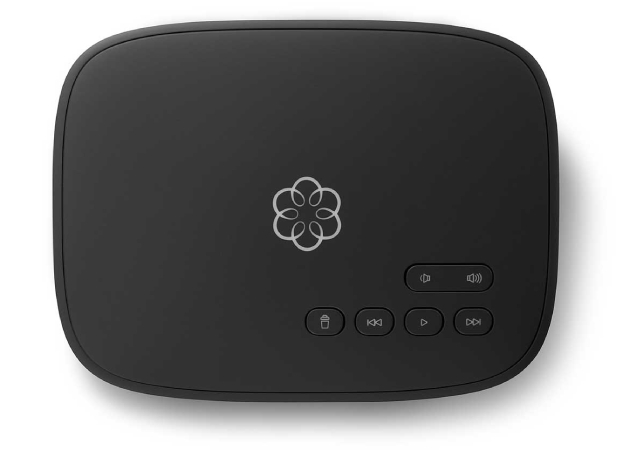
Ooma’s Telo device allows you to make free phone calls via the service. (Source: Ooma)
- Music on hold: When customers call in, this feature plays music you select ahead of time when they need to be put on hold. This helps retain customers because customers placed on hold without musical accompaniment are more likely to hang up.
- Enhanced call block: While this doesn’t identify specific spammers/robocallers, Ooma’s advanced call block does identify potential anonymous callers so that your team can create their own block lists.
- Seven-digit dialing: When dialing out, there’s no need to dial a full 10-digit number. Instead, once the local area code has been set, you can dial the traditional seven digits.
How We Evaluated the Best Business Phone Systems
To assess business phone systems, we took a look at key criteria that small business users would value. These include general features, niche or advanced features only some businesses would need, ease of use, and customer support. We also considered our expert opinion on how valuable each provider would be for the small business customer.
Learn how we evaluated the best business phone systems by clicking on the tabs below:
20% of Overall Score
Affordability is critical for the small business customer, so this criterion has a higher value than some others. To determine if a provider delivered value insofar as pricing, we checked the cost of each tier of the available plans as well as if there were volume or annual discounts.
25% of Overall Score
General features include dialing/communication features that just about every business can use. Examples of criteria include, but are not limited to, unlimited calling within the U.S. and Canada, video and audio conferencing, call management features, and whether the solution grants access to a mobile application.
20% of Overall Score
Some businesses require more niche features that deliver lots of value. Some of the features we reviewed included the presence of an interactive voice response (IVR) system, international calling, what virtual numbers were made available, and the number of third-party integrations.
10% of Overall Score
We evaluated ease of use by determining the level of expertise required to set up and operate the business phone system. We also assessed if providers have an easy to navigate user interface.
10% of Overall Score
We analyzed customer support offerings to see which solutions provided the most extensive coverage. This includes phone support, email support, live chat, and the hours of operation.
15% of Overall Score
We analyzed providers by assessing their standout features, ease of use, popularity, and value for the money. We also considered our evaluative experience and what actual business users say about its services.
Bottom Line
Business phone systems are inexpensive ways for modern businesses to reach their customers. The best business phone system using VoIP technology will not only be cheaper than traditional landline systems but will also outperform legacy technology by incorporating extensive call management features and new channels of communication.
Out of the providers we covered in this guide, we determined that RingCentral delivers the most value for small business users. Not only does it pack in the integrations that enhance the calling experience, but its virtual numbers and international rates are some of the best in the industry. Sign up for RingCentral’s 14-day trial to see how it works for your business.